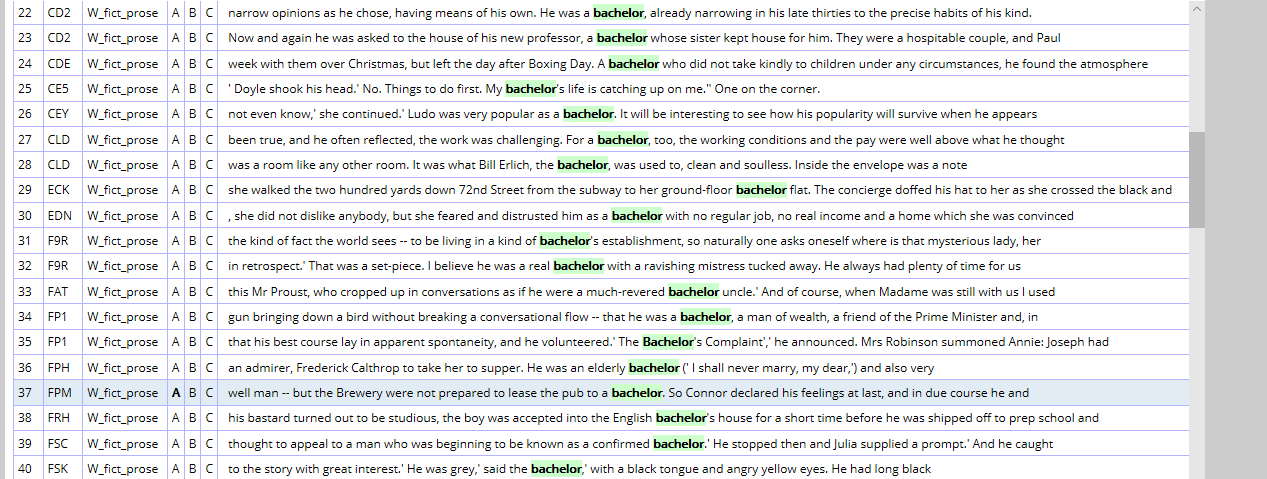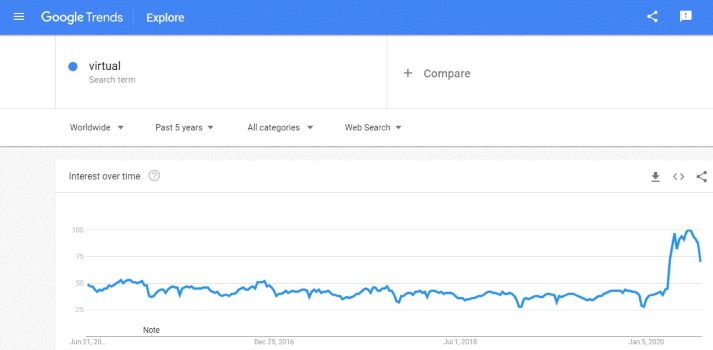Week 4 - meaning, connotation, dictionaries and corpora
This week we are looking at dictionaries and corpus analysis. This is a guest post by Warwick student Mia Harris. We are going to think about who decides what words mean, especially in a country where a language has been standardised (see Week 1).
We will shortly read a blog post by Liz Walter for the Cambridge Dictionary. It talks about the layers of extra meaning words can gather over time; their connotations.
Think for a minute before you read the blog about the different connotations these pairs of words have
Master: Mistress
Bachelor: Spinster
King: Queen
Both bachelor and spinster refer to unmarried people, with 'bachelor' typically referring to men and 'spinster' commonly referring to women. Consider the contexts that you have seen or heard these labels used in. Do they have the same connotations? Why do you think the new label 'bachelorette' is emerging?
Look up any that you are unsure of (spinster is becoming less common in use, so do make a note of any uses of it that you come across). You could even google the words and do a dictionary search for them to see their origins.
The link to the first reading is here:
Walter. L. October 12th 2016 ' Shrewd or cunning, modern or new-fangled? Connotation in Modern English.'
It's important to think about the difference between denotation and connotation. Denoting something implies a meaning which is neutral and carries no information about the way the person doing the describing feels. Connoting takes into account the notion that words acquire layers of meaning over time and can end up nearly always meaning something negative -spinster seems to have acquired negative layers of meaning while bachelor is more complicated (bachelors live in bachelor pads and live bachelor lifestyles - they have a nice flat, a nice car, and plenty of girlfriends).
This layering of meaning happens over time as people use words together. How then do dictionaries decide their meaning?
Let's look at one dictionary's definition of bachelor. The Oxford English Dictionary decides meaning based on uses of a word in written texts. A committee works through these texts and tries to find the first written use of the word with its meaning. There are four different meanings of bachelor before we get to the one we want - they relate to older uses of the word meaning a young knight, or someone doing their first degree at University. Eventually they list the meaning we are interested in, with the first written use they can find being by Chaucer in the Canterbury Tales:
4.
a. An unmarried man (of marriageable age).
"bachelor, n.". OED Online. June 2020. Oxford University Press. https://0-www-oed-com.pugwash.lib.warwick.ac.uk/view/Entry/14313?redirectedFrom=bachelor (accessed June 18, 2020).
You can see that the extracts they give us definitely show the denotative meaning - the lines refer to men who have never been married.
If we look at a different kind of tool for showing how words are used day to day, we can see a very different set of meanings emerging.
Corpus analysis
Corpus means 'body' (compare the word 'corpse'). A corpus is, ideally, a large body of naturally occurring examples of language use, hopefully a mixture of written and spoken, designed to be representative of the way language is used by people everyday (though some corpuses aim to tell us for example how doctors speak, how lawyers write, or how second language learners speak English).
These corpora are 'tagged' by computer programmes so we can ask them to find for example all instances of the noun 'bachelor' within a huge collection. Therefore, features such as connotation can be identified quickly by searching for a word and analysing the context the words occur in socially. Let's do that now.
Here are 19 lines from the British National Corpus. We have chosen these at random (the literary sources are not in date order as they were in the dictionary).

Davies, Mark. (2004-) British National Corpus (from Oxford University Press). Available online at https://www.english-corpora.org/bnc/.
We can see that by looking at more sources we uncover more meanings for the word bachelor.
1. Look at the adjectives that appear before it.
2. Look at the activities the bachelors are doing (or not doing).
3. Look at whether women are bachelors.
4. Do you see different connotations for the word over time? Why do you think these different connotations emerge?
Connotations of words lead often to arguments about their true meaning. In 2019, the Oxford English Dictionary attracted a lot of publicity over its entries for words including‘rabid’, ‘bossy’ and ‘shrill’. The article below discusses this:
Shulist. Sarah, Lavanya Murali Procter and Michael P. Oman-Reagan, 8th December 2016. 'The Power of the Dictionary.'
https://www.sapiens.org/language/dictionary-prejudice/
1. Read it, and make a list of its main arguments. Think about whether you agree or disagree.
This particular incident led to a wider discussion around how dictionary entries are made (the Collins COBUILD dictionary uses a corpus to look at meaning, rather that a committee of people).
2. Ask yourself who you think decides what a real word is, and who decides what it means?
Is it the dictionary (crossword solvers and Scrabble players might say yes)
Is it the speakers? (many people would say that if they and their speech community use a word and understand it that is good enough for them).
Collins publishers make it clear that they prefer the second option -language as it is actually used (especially since corpora also contain spoken data):
‘The examples have been automatically selected from a section of our corpus. We use this multi-billion word collection of texts to research language usage and change over time. The corpus is a rich source of words in action from a wide variety of genres, allowing us to base our dictionaries on language as it is actually used.’
("Bossy definition and meaning | Collins English Dictionary", 2020)
3. Think now of the words 'bossy' and 'assertive' and find some examples of sentences that feature those words.
Are there any common factors?
Are there any noticeable differences in the ways that these words are used?
Could a different word be used in that context to replace them?
How would that affect the connotations of the sentence?
The following article argues that bossy is frequently found with female subjects:
Subtirelu, Nic, March 10th 2014. 'Some data to support the gendered nature of bossy.'
https://linguisticpulse.com/2014/03/10/some-data-to-support-the-gendered-nature-of-bossy/
Consider the example given below the denotation of ‘bossy’ as an adjective in this dictionary entry; a text from Collins’ corpus. What connotations does ‘bossy’ receive in the context of this sentence?
https://www.collinsdictionary.com/dictionary/english/bossy
For your last activity, you can learn how to use Google Trends as a kind of giant web corpus. Choose a term you are interested in and see if it is being used more or less over time, and how.
In this example, I used the ‘Google Trends’ corpus to see how the connotations of ‘virtual’ have shifted in the last few months. From this I found that searches for the word ‘virtual’ have increased greatly over the past few months, likely as a result of lockdown, and more searches are being made about ‘virtual work’ or a ‘virtual call’ rather than ‘virtual gaming’ (a search that was very popular last year) suggesting lockdown may have had an effect on the connotations of ‘virtual’ (perhaps from playful to serious?).
.
